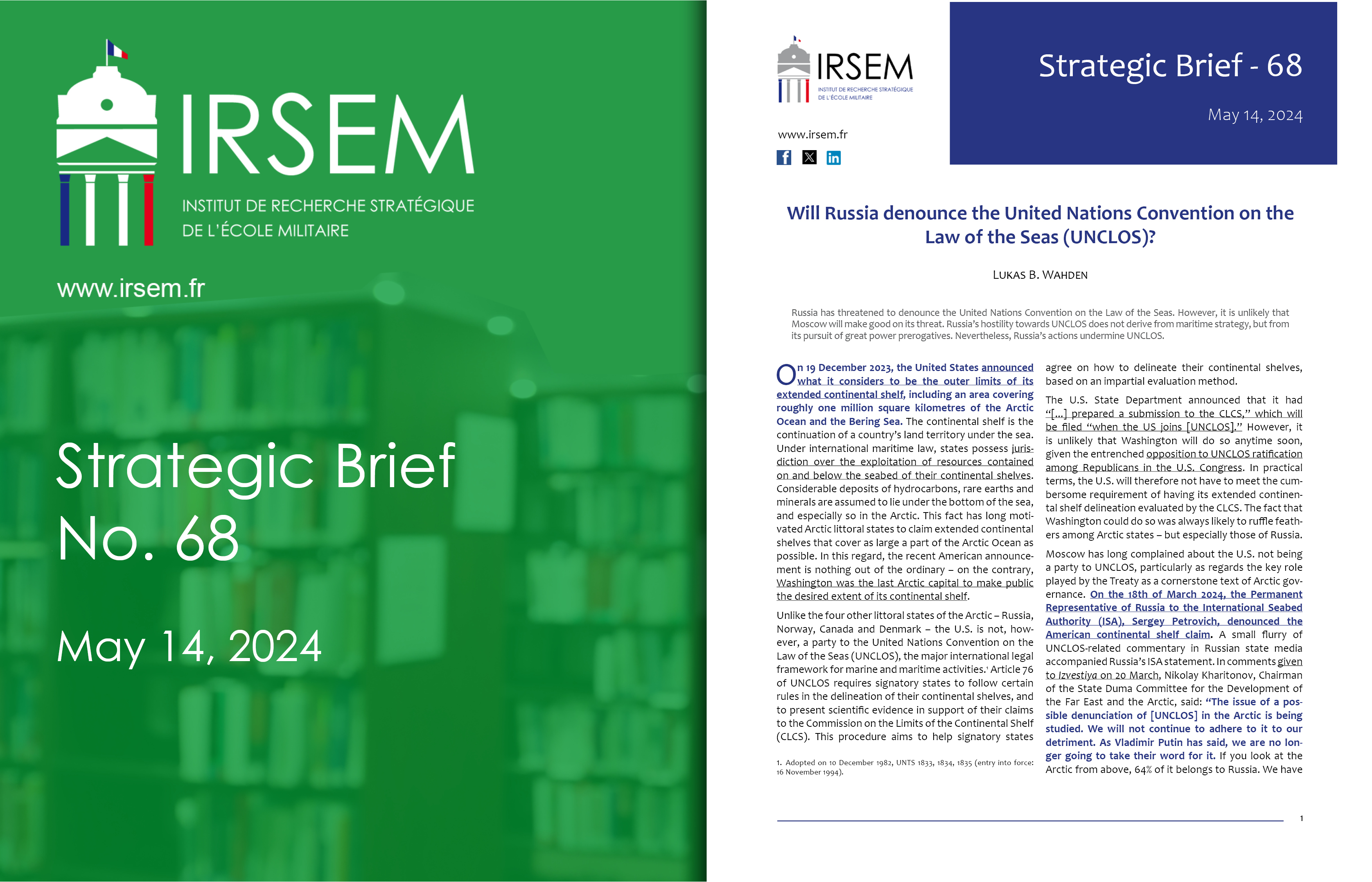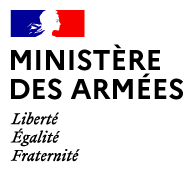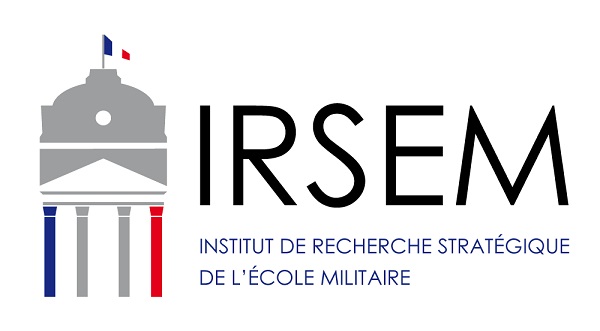
Download Strategic Brief No. 68
Will Russia denounce the United Nations Convention on the Law of the Seas (UNCLOS)?
Lukas B. Wahden
Russia has threatened to denounce the United Nations Convention on the Law of the Seas. However, it is unlikely that Moscow will make good on its threat. Russia’s hostility towards UNCLOS does not derive from maritime strategy, but from its pursuit of great power prerogatives. Nevertheless, Russia’s actions undermine UNCLOS.
On 19 December 2023, the United States announced what it considers to be the outer limits of its extended continental shelf, including an area covering roughly one million square kilometres of the Arctic Ocean and the Bering Sea. The continental shelf is the continuation of a country’s land territory under the sea. Under international maritime law, states possess jurisdiction over the exploitation of resources contained on and below the seabed of their continental shelves. Considerable deposits of hydrocarbons, rare earths and minerals are assumed to lie under the bottom of the sea, and especially so in the Arctic. This fact has long motivated Arctic littoral states to claim extended continental shelves that cover as large a part of the Arctic Ocean as possible. In this regard, the recent American announcement is nothing out of the ordinary – on the contrary, Washington was the last Arctic capital to make public the desired extent of its continental shelf.
Unlike the four other littoral states of the Arctic – Russia, Norway, Canada and Denmark – the U.S. is not, however, a party to the United Nations Convention on the Law of the Seas (UNCLOS), the major international legal framework for marine and maritime activities.[1] Article 76 of UNCLOS requires signatory states to follow certain rules in the delineation of their continental shelves, and to present scientific evidence in support of their claims to the Commission on the Limits of the Continental Shelf (CLCS). This procedure aims to help signatory states agree on how to delineate their continental shelves, based on an impartial evaluation method.
The U.S. State Department announced that it had “[...] prepared a submission to the CLCS,” which will be filed “when the US joins [UNCLOS].” However, it is unlikely that Washington will do so anytime soon, given the entrenched opposition to UNCLOS ratification among Republicans in the U.S. Congress. In practical terms, the U.S. will therefore not have to meet the cumbersome requirement of having its extended continental shelf delineation evaluated by the CLCS. The fact that Washington could do so was always likely to ruffle feathers among Arctic states – but especially those of Russia.
Moscow has long complained about the U.S. not being a party to UNCLOS, particularly as regards the key role played by the Treaty as a cornerstone text of Arctic governance. On the 18th of March 2024, the Permanent Representative of Russia to the International Seabed Authority (ISA), Sergey Petrovich, denounced the American continental shelf claim. A small flurry of UNCLOS-related commentary in Russian state media accompanied Russia’s ISA statement. In comments given to Izvestiya on 20 March, Nikolay Kharitonov, Chairman of the State Duma Committee for the Development of the Far East and the Arctic, said: “The issue of a possible denunciation of [UNCLOS] in the Arctic is being studied. We will not continue to adhere to it to our detriment. As Vladimir Putin has said, we are no longer going to take their word for it. If you look at the Arctic from above, 64% of it belongs to Russia. We have consolidated all this and are obliged to protect what our ancestors left us.” On the same day, Izvestiya published another article on the Arctic, in which the threat to leave UNCLOS was reiterated.
While Russia's threats to ditch UNCLOS are unprecedented, Moscow has not complied with certain aspects of maritime international law for some years already. Russia has designated the entirety of the Northern Sea Route (NSR), an Arctic shipping lane, as internal or territorial waters[2], where it refuses to grant other states the right of innocent passage. Since the beginning of Vladimir Putin’s third term, Russia has progressively tightened access to the NSR. It introduced extensive notification and authorisation procedures for foreign vessels. In the Black sea, Moscow ripped up a 2003 agreement with Ukraine, which classified the Sea of Azov as historical internal waters shared between both countries. Russia then barred Ukrainian naval vessels from passing through the Kerch strait and illicitly closed parts of the Black sea over a period of six months. In 2016, Ukraine instigated proceedings against Russia before an arbitral tribunal under Annex VII of UNCLOS.
Russia's adherence to UNCLOS has therefore been irregular, especially since 2014. Nevertheless, Moscow's recent transgressions should not obscure the fact that Russia was a major proponent of the Convention for several decades prior. In the 1960s, Soviet Admiral Sergei Gorshkov transformed the coastal fleet of the USSR into a blue water navy of global repute. This lastingly altered the maritime outlook of the Soviet Union, which had previously considered itself a traditional land power. During the UNCLOS III negotiations of 1973-1982, the USSR emerged as a major defender of the freedom of navigation and access, the limitation of internal and territorial waters, and restrictions on the uses of seabed. It thereby positioned itself alongside the Western states and Japan, and in opposition to the more restrictive line proposed by Maoist China and the states of the Non-Aligned Movement. Contemporary Russian maritime interests are still similar to those of the USSR. Russia operates a large naval force out of ports constrained by narrow passageways, including the Danish straits, the Bosporus, and the strait of Gibraltar.
Moreover, the Russian economy depends on the freedom of navigation and open sea-lanes guaranteed by UNCLOS. Russia has become the world’s largest exporter of grains, with its main markets in Egypt, Turkey, Sudan and Iran serviced almost exclusively by sea. Following the imposition of Western sanctions in 2014 and 2022, Russian energy firms closed overland pipelines to Europe and shifted oil and gas flows to markets in Asia, Latin America, and Africa. Russia relies on open waterways to transport its oil and gas to its increasingly distant client states.
Finally, Russia has also benefited from jurisdictional advantages that derive from existing UNCLOS regulations. The Russian extended continental shelf claim, which the CLCS currently evaluates, promises a recognition of jurisdiction over a large and extraordinarily resource-rich chunk of the Arctic seabed. Moreover, Russia has relied on UNCLOS to support its strategic aim to restrict the exploitation of Arctic Ocean resources by non-Arctic states, including China. UNCLOS provisions therefore generally cater to Russia’s maritime interests. Russia recognises this, as is evidenced by the central role it accorded to the Convention in its 2023 update of the Russian Foreign Policy Concept. As UNCLOS benefits Russia more than it works to its detriment, it is unlikely that Russia will follow up on its threat to denounce the Convention. Even if it did, however, UNCLOS provisions would continue to apply to Russia in the form of customary international law.
In light of this, how should one interpret Russia's recent threats against UNCLOS? The reasons for Moscow’s behaviour lie not in maritime strategy, but in its general approach to international law. Russia has long accused Western countries, and especially the United States, of selectively applying international rules. For much of the past two decades, Moscow tried to highlight what it perceived to be the ‘hypocrisies’ of U.S. foreign policy by caricaturing American international legal arguments, and marshalling those caricatures in justification of Russia’s own violations of international law. This approach again resurfaced in Vladimir Putin’s declaration of war on Ukraine, during which he extensively referenced the illegality of the U.S. invasion of Iraq. The result is a form of legal pantomime act that has become a standard tool in Russia’s diplomatic repertoire.
In the words of Carl Schmitt, a ‘sovereign is he who decides on the exception.’ From Moscow's point of view, the ‘great power status’ it so desperately craves would allow it to selectively suspend adherence with international rules whenever they contradict its interests. In this regard, Russia wishes to be a full ‘equal’ of the United States and China – even if compared to their military and economic capabilities, Russia remains a middle power at best. The fact that the three major naval powers of the world – the U.S., China, and Russia – refuse to sign, correctly apply, or threaten to denounce UNCLOS may diminish its standing and threaten its long-term stability.
Lukas B. Wahden, M.Sc., is a research assistant at IRSEM.
Contact: lbwahden@gmail.com
[1] Adopted on 10 December 1982, UNTS 1833, 1834, 1835 (entry into force: 16 November 1994).
[2] Under UNCLOS, states possess sovereignty rights over their internal waters and territorial seas, while in contiguous zones, exclusive economic zones, and continental shelves, states are not sovereign, but hold jurisdiction.

